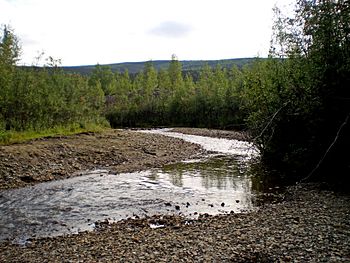Bonanza Creek facts for kids
Quick facts for kids Bonanza Creek |
|
|---|---|

Discovery Claim on Bonanza Creek, August 2009
|
|
| Native name | Ch'ö`chozhù' ndek |
| Country | Canada |
| Territory | Yukon |
| Physical characteristics | |
| Main source | King Solomon's Dome |
| River mouth | Klondike River 64°02′31″N 139°25′20″W / 64.04194°N 139.42222°W |
| Length | 32 km (20 mi) |
| Official name: Dredge No. 4 National Historic Site of Canada | |
| Designated: | 1997 |
| Official name: Discovery Claim (Claim 37903) National Historic Site of Canada | |
| Designated: | 1998 |
Bonanza Creek is a small river in the Yukon Territory, Canada. Its name in the Hän language is Ch'ö`chozhù' ndek. The creek flows for about 32 kilometers (20 miles) from King Solomon's Dome to the Klondike River.
Bonanza Creek became super famous in the late 1800s and early 1900s. It was the main spot for the Klondike Gold Rush. This event brought thousands of people, called prospectors, to the area. They all hoped to find gold. Before 1896, the creek was known as Rabbit Creek. Miners changed its name to Bonanza Creek because they found so much gold there. A "bonanza" means a sudden discovery of something valuable, like a lot of gold!
Contents
The Klondike Gold Rush Story
The Klondike Gold Rush was a huge event that started in 1896. It happened when gold was discovered in Bonanza Creek. This discovery quickly led to one of the biggest gold rushes in history. People from all over the world rushed to the Yukon. They wanted to find their fortune.
How the Gold Rush Began
The gold rush officially started on August 16, 1896. That's when George Carmack, Skookum Jim Mason, and Dawson Charlie found gold. They found it at a spot on Bonanza Creek called the "Discovery Claim." This find was so big that news of it spread fast. Soon, thousands of people were heading to the Klondike region.
Life for Gold Seekers
Life for the gold seekers was very hard. They had to travel long distances, often through tough weather. Many came by boat and then had to hike over mountains. Once they arrived, they lived in tents or simple cabins. They worked long hours, digging and panning for gold. It was a difficult and often disappointing search for many.
Changing the Creek
During the gold rush, the way Bonanza Creek looked changed a lot. Miners used many methods to get the gold out of the ground. These methods included digging, panning, and later, using large machines.
Mining Methods Used
At first, miners used simple tools like picks, shovels, and gold pans. They would dig up gravel from the creek bed. Then, they would wash it in their pans to separate the gold. As more gold was found, bigger methods were needed.
Later, large machines called gold dredges were used. These dredges were like giant floating factories. They scooped up huge amounts of gravel from the creek. Then, they would process it to find the gold. This changed the creek's path and its natural look.
Bonanza Creek Today
By the 1950s, most of the big gold mining operations had stopped. Many miners left the area. Today, only a few small mining operations still work on Bonanza Creek. But the creek is still very important. It's known for its amazing history.
Important Historic Sites
Two special places along Bonanza Creek are now National Historic Sites of Canada. This means they are protected because of their importance to Canadian history:
- Discovery Claim (Claim 37903): This is the exact spot on Bonanza Creek where the Klondike Gold Rush began. Finding gold here started the huge development of the Yukon. It's a reminder of where it all started.
- Dredge No. 4: This is a huge, old gold dredge that has been saved. It shows how important these big machines were for mining gold in the Klondike. It helps us understand the history of gold mining.
Bonanza Creek is a place where you can still feel the excitement of the gold rush. It tells a story of adventure, hard work, and the search for treasure.
Gallery
 | Percy Lavon Julian |
 | Katherine Johnson |
 | George Washington Carver |
 | Annie Easley |




